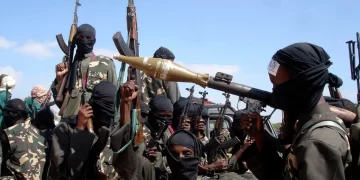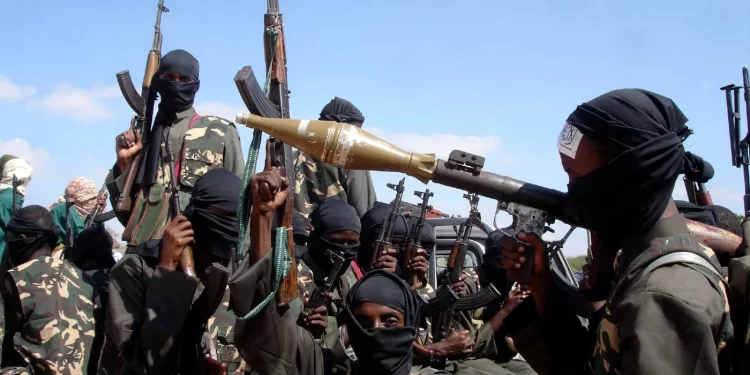WASHINGTON — The U.S. Department of the Treasury’s Office of Foreign Assets Control (OFAC) on Tuesday took action against the Islamic State in Somalia (ISIS-Somalia), its first designation against this affiliate of the Islamic State of Iraq and Syria (ISIS).
This action follows OFAC’s recent October 17, 2022 designations of al-Shabaab financial facilitators and weapons smugglers, further targeting a network of weapons traffickers, their associates, and an affiliated business that has facilitated weapons transfers to multiple terrorist groups.
“Several of the individuals designated have specifically sold weapons to or were active al-Shabaab members. The individuals and entity designated are critical nodes for a weapons trafficking network that is closely integrated with ISIS-Somalia,” the U.S. Treasury said.
They include; Liibaan Yousuf Mohamed (Mohamed), Abdirahman Mohamed Omar, Mahad Isse Aden (Aden), Isse Mohamoud Yusuf (Yusuf), Abdirahman Fahiye Isse Mohamud (Fahiye), Mohamed Ahmed Qahiye (Qahiye), Ahmed Haji Ali Haji Omar (Haji Omar), Liibaan Yousuf Mohamed and Osama Abdelmongy Abdalla Bakr (Bakr).
These networks operate primarily between Yemen and Somalia and have strong ties to al-Qa’ida in the Arabian Peninsula (AQAP) and al-Shabaab.
Treasury also designated a vital supporter of ISIS in Brazil, who has attempted to serve as a liaison for the terrorist group.
Terrorist groups operating in the region continue to commit violent acts in Somalia, targeting Somali civilians, civil servants, and first responders to instil fear.
On October 29, 2022, al-Shabaab claimed responsibility for a devastating bombing in Mogadishu that claimed more than 100 lives and resulted in nearly 300 civilians injured.
“We extend our heartfelt condolences to all who lost loved ones and were injured in Saturday’s horrific attack and strongly condemn this indefensible act of terrorism,” said Under Secretary of the Treasury for Terrorism and Financial Intelligence, Brian E. Nelson.
“Today, we take direct aim at the network’s funding and supplying both ISIS-Somalia and al-Shabaab that support their violent acts. The involvement of those designated today in other criminal activity, including piracy and illegal fishing, demonstrates the extent of ISIS-Somalia’s integration with illicit networks and other terrorist organizations operating in the region. Treasury is committed to working with partners in the region to disrupt the financing of ISIS and al-Shabaab.”
ISIS-Somalia pledged allegiance to ISIS in October 2015 under Abdiqadr Mumin (Mumin), previously a senior leader of an al-Shabaab faction operating in the Somali region of Puntland.
The Department of State designated ISIS-Somalia in 2018, as well as Mumin in 2016, both as Specially Designated Global Terrorists (SDGT) pursuant to E.O. 13224.
Disrupting source of revenue
ISIS-Somalia generates much of its funding by extorting local communities for funding and recruiting, often under the threat of violence.
ISIS-Somalia has also continued to conduct vehicle-born improvised explosive device (VBIED) attacks against civilians. The group punishes, intimidates, and assassinates Somali businessmen and civilians who do not support them financially or provide them with supplies.
In spite of ISIS-Somalia’s attempts to generate revenue, its members receive low wages. ISIS-Somalia also commonly works with other terrorist organizations such as al-Shabaab and Somali pirates and smuggling groups, who will sell to any paying buyer, to obtain weapons and other resources.
Sanctions implications
All property and interests in the property of these persons that are in the United States or in the possession or control of U.S. persons must be blocked and reported to OFAC.
In addition, any entities that are owned, directly or indirectly, 50 percent or more by one or more blocked persons are also blocked.
OFAC regulations generally prohibit all dealings by U.S. persons or within the United States (including transactions transiting the United States) that involve any property or interests in property of designated or otherwise blocked persons.
In addition, persons that engage in certain transactions with the persons designated today may themselves be exposed to sanctions or subject to enforcement action.
Furthermore, unless an exception applies, any foreign financial institution that knowingly facilitates a significant transaction or provides significant financial services for any of the targets designated today could be subject to U.S. sanctions.
Read full profiles of the targets who have been sanctioned here:









